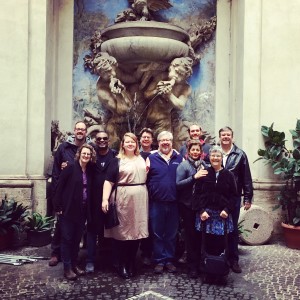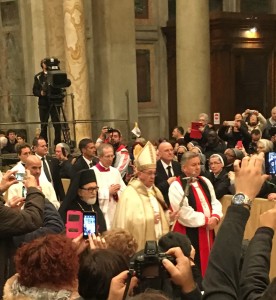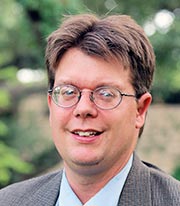
During the last week of January, I took nine students from Seminary of the Southwest for a study trip to Rome. Our trip came on the heels of the recent Anglican Primates’ Meeting in which the Episcopal Church was reprimanded for its actions and teachings regarding human sexuality. For the previous weeks I had been puzzling over how reconciliation was possible within the Anglican Communion. In Rome, I glimpsed glimmers of such a future.
We were fortunate to be in Rome at the end of the Week of Prayer for Christian Unity. The final day, the feast of the Conversion of St. Paul, is marked by a papal vespers service held at the Basilica of St. Paul Outside the Walls. Our group received tickets to this event because our trip had been coordinated through the Anglican Centre of Rome, whose director, Archbishop David Moxon (the former primate of New Zealand), serves as the Archbishop of Canterbury’s official representative to the Holy See. The service had two extraordinary symbolic moments. The first was in the procession. During this, the heads of all the churches in Rome, including the non-Catholic one processed in. We all saw Austin Rios, Southwest alumnus and rector of St. Paul’s Within the Walls, process, wearing the Southwest shield on his tippet. At the end of the procession, Pope Francis processed with Archbishop Moxon on his left and the representative of the Patriarch of Constantinople, Archbishop Gennadios on his right. This was an amazing sight to me of the hope for reconciliation among these divided churches.
During his homily, Pope Francis spoke movingly of the need for reconciliation. He said, “In this Extraordinary Jubilee Year of Mercy, we must always keep in mind that there cannot be an authentic search for Christian unity without trusting fully in the Father’s mercy. We ask first of all for forgiveness for the sins of our divisions, which are an open wound in the Body of Christ. As Bishop of Rome and pastor of the Catholic Church, I want to ask for mercy and forgiveness for the behavior of Catholics towards Christians of other Churches which has not reflected Gospel values. At the same time, I invite all Catholic brothers and sisters to forgive if they, today or in the past, have been offended by other Christians. We cannot cancel out what has happened, but we do not want to let the weight of past faults continue to contaminate our relationships. God’s mercy will renew our relationships.”
These words get right at the heart of our common life together as Christians. They speak directly to our divisions as Christians and the fact that our divisions sometime lie within our own faults. In order to proceed past divisions, a humble accounting of sins committed is sometimes necessary.
As a symbol of Francis’ commitment to the path of reconciliation, the pope invited Archbishop David and Archbishop Gennadios to join him in the blessing of the congregation. Archbishop David offered his own thoughts about this moment: “This invitation suggested that the blessing of God and the grace of God flow through our diversity in this moment of unity. . .To me it seems a very poignant, unforgettable, and evocative sign of our essential unity in baptism and of our desire to share the blessings of God whenever there is opportunity; to bless and be blessed because we belong to the Church of the Triune God, which is One, Holy, Catholic, and Apostolic.”

For me, the ability of an Anglican archbishop and a former primate to raise his hand in blessing with Pope Francis so closely on the heels of the Primates’ Meeting tells me that our differences are not as great as our common life in Christ. Reconciliation is possible. It sometimes comes in small moments with fits and bursts. It requires repenting of the hurts we have done to others and it means being willing to forgive others who have harmed us.
For the Episcopal Church, reconciliation might require recognizing that our stance on human sexuality is genuinely hurtful to Anglicans elsewhere, especially those who might face violence from others because of it. I am not sure what our repentance might be from this harm done, because I believe the full inclusion of LGBT people is itself an act of reconciliation. But we must acknowledge the tension we live within. At the same time, we must be willing to be reconciled in our own ways with those in the Anglican Communion we might be inclined to view as hostile to us. Are we willing to raise our hand in blessing with them? If Francis can set Anglicans, Roman Catholics, and Orthodox on a path of reconciliation, where is our path within the Communion? As we stand on the verge of another Lent, a commitment to reconciliation is a work that all churches can benefit from.
 Dan Joslyn-Siemiatkoski is the Duncalf-Villavaso Associate Professor of Church History at Seminary of the Southwest. Passionate about sharing the story of Christianity with his students, he is also active in Jewish-Christian relations.
Dan Joslyn-Siemiatkoski is the Duncalf-Villavaso Associate Professor of Church History at Seminary of the Southwest. Passionate about sharing the story of Christianity with his students, he is also active in Jewish-Christian relations.

